Emmy FYC: "Mrs. America" for Best Period Costume Design
 Sunday, July 12, 2020 at 6:30PM
Sunday, July 12, 2020 at 6:30PM 
The voting period for the Emmy nominations is coming to an end. It's true that, now, a FYC may feel a bit late, but I can't let go of the opportunity to shine a light on one of the most impressive achievements in recent television. While I love to explore the marvels of acting, costume design will forever be my main passion when talking about the performing arts. The Emmys are particularly interesting when it comes to the honoring of costume excellence since, unlike the Oscars, they have categories separating Period, Contemporary and Fantasy designs, not to mention separate prizes for live specials. In theory, that makes it somewhat easier for great costuming to be honored but that's not always the case, especially when the clothes being considered are more subtle than showy. Sometimes, sheer flashiness can blind people, and subtler creations are left unrewarded.
Hopefully, such an unjust fate won't happen to the wondrous Mrs. America…

Bina Daigeler, the German costume designer of Mrs. America, should rightfully be a name known to cinephiles everywhere. In the past 25 years, she has worked with some of the best living filmmakers, like Pedro Almodóvar, Wim Wenders, Jim Jarmusch, and Steven Soderbergh. It was Daigeler who dressed Penélope Cruz in rich reds in Volver, who conjured the millennia-old styles of Only Lovers Left Alive's vampires, and invented the chameleonic looks for Cate Blanchett in Manifesto. 2020 was shaping up to be a breakout year for the designer who successfully jumped from auteur cinema to Disney blockbusters with Mulan. It's uncertain when we'll finally get to see that live-action remake, but, in the meantime, we can marvel at another of Daigeler's great feats of design.
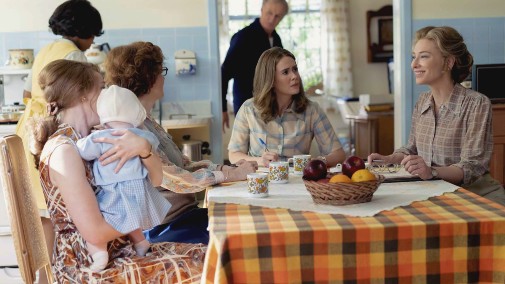
Mrs. America, which tells the story of the fight for, and against, the Equal Rights Amendment during the 1970s, is a miniseries where the costumes play a role of great importance. On one hand, Daigeler's creations must reproduce the individual styles of historical figures whose clothes are well-documented. On the other, the reality is often devoid of narrative through lines, making it imperative that the designer figures out a way of telling the show's story while marrying drama and fact. There's also the matter of establishing the period, often using stylistic short-hand that may err on the side of archetypical simplifications, but is nonetheless necessary. In scenes where the pro-ERA faction face-off against their ideological opposites, for example, we must easily recognize the two groups in an instant.
The designer accomplishes such differentiation through a portraiture of fashion history that's painted with broad strokes. There is a homogeneous, hyper-feminine quality to the minions of Phyllis Schlafly, all pearl necklaces and shirtwaist dresses, soft cardigans, and sensible heels. In contrast, the pro-ERA women are riotous explosions of inchoate style with only the ideal of individualism holding them together. Some motifs may repeat, like braless silhouettes and bohemian details, but the projected image is one of barely controlled chaos. To look at their office spaces is to see inverse reflections, the demure rigidity of tradition versus the relative diversity of progress.
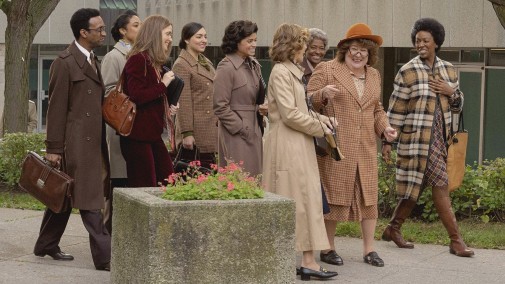
There's also the matter of color. One of the most striking aspects of Mrs. America is how it evokes the look of the 1970s without resembling a pastiche of retro aesthetics. The cinematography may be grainy in a way that recalls the cinematic classics of the era, but it doesn't deny its modernity. That's evident in the colors, which don't attempt to reproduce the tonalities of 1970s American film stock. Curiously enough, that recognizable palette, with an overwhelming presence of warm browns and pale blues, dusty pinks mixed with a hint of burnt orange and very little green, is transferred to the costumes rather than the cinematography. At times, it seems as if Daigeler took frames from Alice Doesn't Live Here Anymore or Network and used them as color swatches. Such chromatic games also help to give cohesion to a wardrobe full of the drastic stylistic contrasts mentioned before.
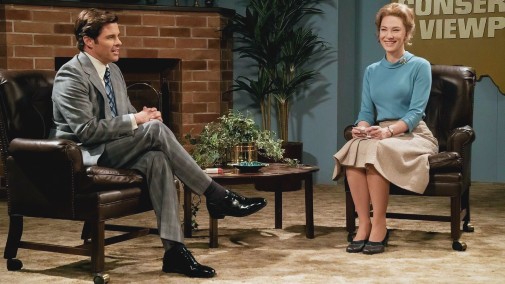
Still, the designer's work must also consider the case of each character and their place in the narrative, with special attention given to the more famous persons. Schlafly, for instance, is a bit of a walking contradiction. Her clothes exude a sense of conservative primness in their details and overall construction, but her outfits usually have more to do with office fashion than the style of American housewives. Another example is that of Shirley Chisholm, whose real-life ensembles are cannily adapted for the screen. A lot of the patterns and garments are near-exact reproductions, but their colors are often changed, either intensified or desaturated, the materials altered to make the disparity between her, her political adversaries, and inconsistent allies read more starkly than it might have in reality.
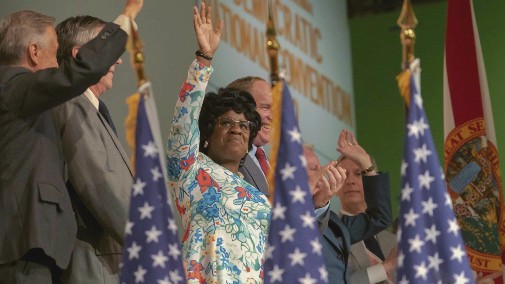
All this is a good reminder that, even when dressing history, a costume designer's job is never mere mimicry or fashion archeology. Mrs. America is a masterpiece of design as a sociopolitical signifier, period evocation through fashion and individual characterization by means of style. It should rightfully be nominated for the Emmy and, quite honestly, walk away with the gold. First up though, let's see if it gets nominated at all. While it might seem like a lock, you never know with the Television Academy. Remember when Mad Men's costumes, which never won this category, were snubbed for the series' last season? Let's keep our fingers crossed for Bina Daigeler.
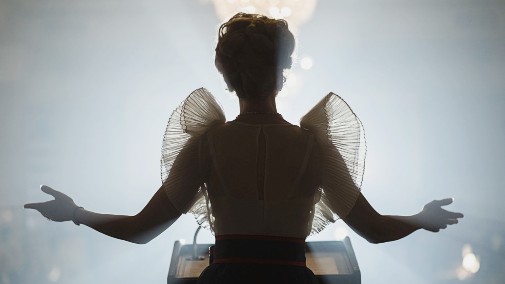
You can watch all nine episodes of Mrs. America on Hulu.



Reader Comments (8)
I hope the lack of comments isn't an indicator of the interest level in this series. It was one of the best things I watched all year. As someone who was in high school during the 70's the period details rang true for me. Bina Daigeler did outstanding work, she caught the spirit of the wild colours and bell bottomed pant suits that make this era so iconic.
If you haven't seen this series yet - do so soon, you won't regret it.
The best miniseries this year. I hate Phyllis so much but Cate deserves that Emmy
Lady Edith -- I've been surprised at the lack of comments whenever we post about Mrs America too. Murtada did a few pieces and same response. Meanwhile others said ' why isn't the Film Experience covering this show?" so it's been a bit odd.
as for me I've actually had trouble getting through it. I admire it a lot but something about the structure isn't working for me. Like it's trying to cover too much and too many facts when the best episodes are the ones that zero in with laser precision on one very specific thing (like Chisholm's Presidential run or the "couples debate")
I thought Murtada's podcast recaps on the series were great. But they were featured only every two weeks, and even then, they aired four days after a new episode, which is tough when people want to comment on a show the morning after they watched it. No fault to Murtada, but it seemed odd that it was the only coverage this site gave to a limited series that was so filled with great actresses, especially since it was aired concurrently with TFE's recaps of every episode of Hollywood. I wasn't one who asked for more coverage of Mrs. America; I know I can go elsewhere for it. But it did chafe a bit.
Anyway, Peggy Sue, I do agree that the series is a masterpiece. But you know, you can lead a horse to water, but you can't make him drink.
Sorry, I meant that comment to be addressed to Lady Edith!
Beautiful write-up, and agree it should be nominated. Here’s my non-expert take: if it wasn’t for the costumes would you know it was the 60s? I exaggerate for effect, but the subject matter and the attitudes still ring so true today in some circles that you could easily swap out for modern-day costumes and ponder.
Nat: I have the exact same take-away from the show. I enjoy it don’t get me wrong; but I’m still at episode 5 and won’t binge it. I will finish the series because it’a superbly acted and created, and history we should know. But it’s trying so hard to make the point that some characters become caricatures. Phyllis’ half is easier to digest; the Liberals’ half is so much fun but is as alive as it is disjointed. Like that scene where Gloria goes to visit Betty and finds her friend Nathalie in her apparement instead; the dialogue is subtle, but the setting is so forced. Alternatively, Phyllis’ observations and conversations with her closeted son are so well crafted.
I hope it wins a few awards - I find myself thinking of the show a lot.
jules -- perhaps we misread the situation but we tend to shy away from writing about things if there are super few comments when we do.
Thanks Nathaniel and Jules - I am happy that you watched the series. I found the series to be a slow burn but I was drawn into it just the way I was by "Mad Men" - which was also a slightly disjointed series. (with great acting and [period detail)
My only critique would be that there should have been at least some attention given to a college aged woman at that time. Someone working on George McGovern's campaign and talking about the issues from that perspective. Phyllis S. was like this Stepford Wife who came in and rained on everyone's parade. I still hate her. But Cate Blanchett was fantastic.